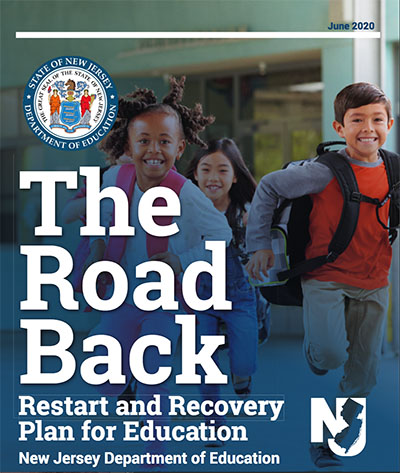“Today’s guidance comes with one overarching requirement: that our public schools will open in some capacity with the health of students, their families, and educators being the TOP PRIORITY.” – Governor Phil Murphy
NJDOE is basing its guidance for schools on four basic principles:
- Ensuring a conducive and learning atmosphere
- Supporting educational leaders with planning
- Providing policy guidance and necessary funding to schools
- Security continuity of learning
Each district is expected to collaborate with community stakeholders to develop a plan to reopen schools in the fall that best fits the district’s local needs. The guidance provides anticipated minimum standards regarding health and safety that districts should use as they plan for reopening. The guidance also provides additional considerations that may help districts as they develop their plans. Schools must announce their plans to families at least four weeks before the start of classes, so most families should hear their districts’ plans by early August.
“Knowing that the health of students and staff is our number one concern, our guide will begin to fill in the picture of what a safe education system will look like in the fall.” – Lamont O. Repollet, New Jersey Education Commissioner
- All faculty and staff must wear face coverings.
- Students will be strongly encouraged to wear face coverings and required to do so when social distancing cannot be maintained.
- All schools will sanitize the school daily.
- It is recommended that students and staff be seated at least six feet apart in class when practicable. When weather allows, windows should be opened to allow for greater air circulation.
- School bus drivers will be required to make sure students wear face coverings while being transported to and from school.
- School bus operators should encourage social distancing per CDC guidelines. CDC recommends seating student one per school bus row and skipping a row between each child, if possible. Barriers separating rows of bus seats may also be considered. Increased ventilation (i.e. opening windows) is also recommended in the guidelines.
Schools should consider:
- Staggering mealtimes to allow for social distancing;
- Discontinuing self-serve or buffet lines;
- Having students eat meals outside or in their classrooms;
- Requiring staff to disinfect eating areas between groups.
- Recess should be held in staggered shifts, with efforts to promote social distancing and hygiene protocols.
Schools are encouraged to identify small groups of students and keep them together (cohorting) to ensure that student and staff groupings are as static as possible, thereby limiting exposure to large groups of students.
Specific Special Education Recommendations
NJDOE earlier issued specific guidance on requirements to provide special education services during the COVID-19 response in March. The Road Back Plan emphasizes districts must continue to meet their obligations to students with disabilities under IDEA to the greatest extent possible, stating “Specific strategies and considerations for students with disabilities must be critical points of discussion for every return-to-school scenario.”
The NJDOE recommends that school districts consider the following when addressing the education of students with disabilities for the 2020-2021 school year:
- Procedures to address the return to school of medically fragile students and students with physical or health impairments who may require accommodations and modifications as part of a 504 Plan. School districts should communicate frequently with the families of students with significant medical risk factors to determine if additional precautions or unique measures are necessary prior to a student’s return to school.
- Individualized Education Program (IEP) teams should review student data/student progress to determine whether critical skills were lost during the period in which remote instruction was being provided to students and determine the need for additional services to address learning loss.
- IEP teams should consider the impact of missed services on student progress towards meeting IEP goals and objectives and determine if additional or compensatory services are needed to address regression and recoupment of skills within a reasonable length of time.
- IEP teams should develop procedures to complete overdue and/or incomplete evaluations to determine eligibility for special education services.
- The use of school guidance department staff and child study team personnel to identify students whose postsecondary plans may have been adversely affected by the COVID-19 pandemic and provide support, resources, and assistance, which may include facilitating connection to community organizations, scholarship programs, county, state, and federal opportunities to access support.
- Clear communication to parents/guardians of the procedures for student referrals and evaluations to determine the eligibility for special education and related services or a 504 Plan as required by federal and state law.
Governor Murphy continues to note that guidelines and school district plans are subject to change if evolving circumstances require more restrictive measures or a return to all-distance learning.


 .
.